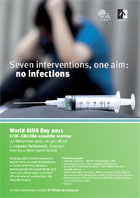The European Centre for Disease Prevention and Control (ECDC) and the European Monitoring Centre for Drugs and Drug Addiction (EMCDDA) will join forces in Brussels on the eve of World AIDS Day (30 November) to host a scientific seminar at the European Parliament. The seminar will bring prominent speakers to Brussels to discuss with MEPs ways to prevent and control infections among people who inject drugs and to address the risk and burden of HIV and AIDS-related infections, such as hepatitis B and C in EU countries.
Seven interventions, one aim: no infections among people who inject drugs
During the seminar, the agencies will invite MEPs to explore seven interventions to reduce infectious diseases among people who inject drugs and learn more about ways to prevent HIV and related infections in this vulnerable group. These interventions are presented in a new guidance document published by the agencies last month: Prevention and control of infectious diseases among people who inject drugs.
Many European countries have achieved substantial progress in recent years in preventing drug-related infections. Drug injecting, however, remains a major cause of infectious diseases across Europe. The interventions proposed in the document range from the supply of injection equipment, testing and vaccination to the treatment of infections and drug dependence. These are best applied in combination and ideally in the same venue for maximum effect. Common blood-borne viruses among people who inject drugs include H IV, hepatitis B and hepatitis C. These are mainly spread through the sharing of needles, syringes and drug preparation equipment or unprotected sexual contacts.
Commenting on the guidance EMCDDA Director Wolfgang Götz said: ‘Blood-borne infections can spread very rapidly among people who inject drugs, which in turn can lead to high treatment costs, lost productivity and human suffering. A central message in our report is that we now know how to prevent infections in this group. The challenge before us is to ensure that this understanding is translated into effective services. Europe can still do better in reducing the public health burden posed by these preventable diseases’.
’Prevention of infections among people injecting drugs is achievable and effective – if it is properly executed’, stresses ECDC Director Marc Sprenger. ‘That is why we need closer cooperation between all sectors of health care to win the trust of people who inject drugs and offer them health services as outlined in our joint guidance’.
The ECDC–EMCDDA joint publication is published together with a ‘Guidance in brief’ summary and with two technical reports providing a full assessment of the evidence.
Notes
The seminar will be held in Room A5E-2, Altiero Spinelli Building at the European Parliament in Brussels on 30 November 2011 from 16:30 to 18:00. Contact: Caroline.Daamen@ecdc.europa.eu
Tel. (46) (0) 8 586 01 678.
Mobile. 00 46 (0) 7 61 25 15 08
For more, see: www.emcdda.europa.eu/publications/ecdc-emcdda-guidance
Related news release in cs, de, et, en, fr, pt, ru



















